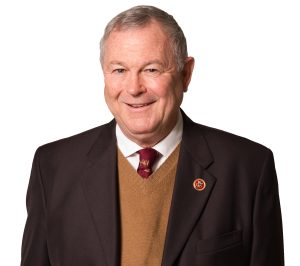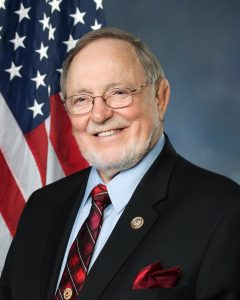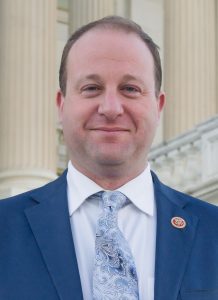If you’ve ever found yourself wondering just how mainstream cannabis has become lately, consider the fact that a Congressional Cannabis Caucus has recently been formed within our government to fight for legalization and protect states’ already established cannabis industries.
February 2017, two members of opposing political parties of the United States House of Representatives, Dana Rohrabacher and Earl Blumenauer, joined forces and formed the Congressional Cannabis Caucus. Legislative cannabis reform and individual states’ rights are the main issues this caucus is centered around. Both Rohrabacher and Blumenauer have a history of introducing and supporting progressive cannabis bills in their states.
Dana Rohrabacher, a Republican House of Representatives member from Orange County, California (District 48), introduced the Rohrabacher-Farr Amendment with U.S. Reps. Maurice Hinchey and Sam Farr in 2003 h Its purpose is to prevent the U.S. Department of Justice from interfering with states that have medical cannabis programs, and after a long wait it was passed by Congress and became law in December 2014.
Earl Blumenauer, a Democratic member of the House of Representatives from Portland, Oregon (District 3), has also been involved in large scale cannabis reform. He was a big supporter of Oregon Ballot Measure 91 in 2014, to legalize recreational cannabis in the state.
So in response to the fear and confusion about what may happen to the cannabis industry, the Congressional Cannabis Caucus was born. Rohrabacher and Blumenauer, along with Don Young, a Republican from Alaska (district at large) and Jared Polis, a Democrat from Northwestern Colorado (District 2), have banded together to protect the rights of states with medical marijuana, increase research efforts, decriminalize or legalize, and change banking and tax regulations for cannabis industry businesses. They occupy four out of four hundred thirty-five seats in the house.
Founding members of the Congressional Cannabis Caucus
Shortly after its inception, the National Cannabis Industry Association, the Marijuana Policy Project, the Drug Policy Alliance, NORML, Americans for Safe Access, Students for Sensible Drug Policy, Law Enforcement Action Partnership, Doctors for Cannabis Regulation, and Clergy for a New Drug Policy issued a joint statement conveying their excitement for this new caucus.
“We commend Representatives Blumenauer, Rohrabacher, Polis, and Young for their leadership on the issue of cannabis policy. The establishment of a Cannabis Caucus will allow members from both parties, who represent diverse constituencies from around the country, to join together for the purpose of advancing sensible cannabis policy reform. It will also facilitate efforts to ease the tension between federal prohibition laws and state laws that regulate cannabis for medical and adult use.”
Here’s some information about the founding members of the Congressional Cannabis Caucus and their plans for cannabis reform in the United States:
Dana Rohrabacher (R-CA-48)

Dana Rohrabacher
In his early political career, Rohrabacher was part of the Reagan administration. From 1976 to 1980, he was an assistant press secretary to Reagan’s presidentail campaigns. From 1981 to 1988, he was one of President Reagan’s senior speech writers. In 1988, Rohrabacher left the Reagan administration to secure the open House seat recently vacated by Dan Lungren. He’s served multiple districts in the State of California: 42nd District from 1989–1993, 45th District from 1993–200, 46th District from 2003–2013, and he is currently in the 48th district since 2013.
His stance on cannabis reform circles around the importance of upholding our individual constitutional freedoms. According to Rohrabacher, “the Founding Fathers did not want the federal government to interfere in people’s personal freedoms. Supporting states’ rights and independent freedoms should remain consistent: I’m sorry, you can’t make that argument over here and then just ignore the fact that it’s applicable to this other area of decision-making. This issue is critical to some Americans’ health and well-being. People are suffering. The law is wrong. We have a caucus together, a bipartisan caucus. We’re going to change that situation.”
Earl Blumenauer (D-OR-03)

Earl Blumenauer
From 1969 to 1970, Blumenauer organized a campaign aimed at lowering Oregon’s voting age, entitled “Go 19”. Despite it being unsuccessful at the time, his efforts eventually helped lead to the installment of the 26th Amendment to the United States Constitution which lowered the voting age from 21 years old to 18. In 1972, he was elected to represent District 11 as a Democratic member of the Oregon House of Representatives.
He was re-elected in 1974 and 1976 and staying in District 11 until 1979. Between 1975 to 1986 he was served the Portland Community College Board, and then the Multnomah County Commission. In May 1986, he was elected to serve the Portland City Council and did so until he joined the US House of Representatives in 1996.
Blumenauer’s main focus in the Congressional Cannabis Caucus is amending IRS code 280E, which is in regard to banking and taxes in the cannabis industry. He wants cannabis business to be able to deduct the same kind of expenses as other businesses. He states that “a fix will be proposed via standalone legislation, but it could be achieved in the context of the back and forth of tax work. It’s time for us to move forward with this bipartisan caucus.”
Don Young (R-AK-At Large)

Don Young
Young’s political career began when he was elected Mayor of Fort Yukon, Alaska, in 1964. He served as mayor until 1968, and in 1970 he was elected to State Senate, which is a job he says he wasn’t particularly fond of. He began his run for Congress in 1972, and by 1974 he was elected to the US House of Representatives. He has been re-elected in every vote since then and is still currently serving the at-large district, which covers the entire state of Alaska.
Similar to Blumenauer, Young expressed concern with the modern banking and tax system in the cannabis industry. Young is particularly interested in helping find a solution to the industry’s banking problems. “You have to be for states’ rights or against states’ rights. I think we can make a lot of progress this session and next session,” he says.
Jared Polis (D-CO-02)

Jared Polis
Polis, a man known to contribute to progressive causes, co-chaired both the “Coloradans for Clean Government” committee and the “Building for our Future” campaign. Coloradans for Clean Government lobbied in support of an amendment that would ban registered lobbyists from giving gifts to government officials, establish a $50 annual limit on gifts from non-lobbyists, and establish a 2-year “cooling-off” period before former legislators can begin lobbying. In November 2006, it was approved by 62 percent of voters.
Building for our future was a campaign that supported bonds to be provided to improve older schools in Boulder. The measure was approved in November 2006, and Boulder Valley School District issued $296 million, which was the largest school bond proposal in Colorado that year.
Polis sees how beneficial the cannabis industry has been on the economy in legal states, and he wants the federal government to see it too. “We’re really starting to see policymakers view the cannabis industry more favorably for what it is. The industry provides money for schools, creates jobs and bolsters the economy as opposed to supporting cartels and addicts. This caucus is an opportunity to show that the consumers and entrepreneurs in the marijuana industry are an important part of the American economy and there’s an impact on jobs if the federal government doesn’t repeal this outdated provision. The next challenge is to take the model adopted by states such as Colorado and Washington and enable all states to follow it — free from federal bullying and federal interference.”
A brief history of this century’s congressional cannabis battles and other important cannabis milestones:
- 1906 Pure Food and Drug Act was enacted to preventing the manufacture, sale, or transportation of certain foods, drugs, medicines, and liquors .
- 1900-1920s Mexican immigrants introduce the recreational use of cannabis to Americans.
- 1930’s Fear of cannabis begins.
- 1930 Creation of Federal Bureau of Narcotics.
- 1932 Uniform State Narcotic Act, to ensure the rules were the same across all the states ]
- 1936 Reefer Madness- a propaganda movie with extremely exaggerated depictions of cannabis users. The intent was to scare people from ever trying marijuana.
- 1937 Marijuana Tax Act imposed a tax on the sale of cannabis and hemp
- 1944 La Guardia Report finds marijuana less dangerous than previously thought
- 1951-1956 Stricter sentencing laws are implemented.
- 1960’s Cannabis use becomes popular with youth and counter-culture.
- 1968 Creation of the Bureau of Narcotics and Dangerous Drugs
- 1970 Repeal of most mandatory minimum sentences related to cannabis charges.
- 1971 President Nixon declared a “war on drugs” which included cannabis
- 1973 The US Drug Enforcement Agency was created.
- 1986 Anti-drug abuse act, mandatory minimum sentences are re-enforced.
- 1989 President Bush senior continues the “war on drugs”
- 1996 California become the first state to legalize medical marijuana.
- 1998 Presidents Ford, Carter, and Bush urge voters to reject medical marijuana, one month later Alaska, Oregon, and Washington Become 2nd, 3rd, and 4th states to legalize medical marijuana.
- 1999 Maine legalizes medical marijuana
- 2000 Hawaii, Colorado, and Nevada legalize medical marijuana
- 2001 Supreme court rules “there is no medical necessity exception to the Controlled Substances Act.”
- 2002 Court rules in Conant v. Walters that the government cannot revoke a doctor’s license for simply recommending medical marijuana.
- 2004 – DEA wants to review marijuana for possible rescheduling, also, Montana and Vermont legalize medical marijuana.
- 2006 Rhode Island legalizes medical marijuana after legislature overrides governor’s veto
- 2007 New Mexico legalizes medical marijuana.
- 2008 Michigan legalizes medical marijuana.
- 2010 New Jersey, Arizona, and DC legalize medical marijuana. US Dept of Veterans Affairs relaxes rules about cannabis use for veterans.
- 2011 Delaware legalizes medical marijuana.
- 2012 Connecticut and Massachusetts legalize medical marijuana. Colorado becomes the first state to legalize recreational use for adults 21 and older.
- 2013 New Hampshire and Illinois legalize medical marijuana.
- 2014 Maryland, Minnesota, New York legalize medical marijuana.
- 2015 Alaska, DC, Oregon, Washington legalize recreational cannabis.
- 2016 DEA once again considers rescheduling marijuana. Arkansas, Florida, North Dakota and Ohio get medical marijuana. California, Nevada, Massachusetts, and Maine legalize recreational cannabis.
- 2017 The year of cannabis! Experts say the green rush is here and it’s bigger than the dot com boom 11 more states are considering upgrading their cannabis laws.
- 2018 The Farm was amended to include hemp, making industrial hemp and hemp flower with less than 0.3% THC federally legal.
- 2019 There are currently 33 states with medical or recreational cannabis, and counting. CBD is a mainstream, multi-billion dollar industry. New cannabinoids, terpenes, and compounds are being discovered and isolated with regularity. It’s a great time to be a cannabis consumer in America!
With so many supporters, groups, advocates, and this new Congressional Cannabis Committee, legalization may not be such a distant dream anymore.
For more stories like this one, subscribe to the CBD Business Weekly Newsletter.







